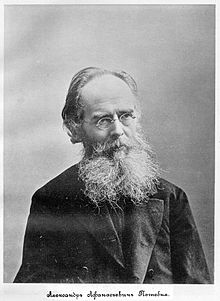Alexander Potebnja
| Alexander Potebnja | |
|---|---|
 |
|
| Native name | Александр Потебня |
| Born | 22 September 1835 |
| Died | 11 December 1891 (aged 56) Kharkov |
| Influences | Wilhelm von Humboldt, Johann Gottfried Herder |
| Influenced | Lev Vygotsky |
| Spouse | Maria Potebnja |
Alexander Potebnja (Russian: Алекса́ндр Афана́сьевич Потебня́;Ukrainian: Олекса́ндр Опана́сович Потебня́) was a Ukrainian-Russian philosopher and linguist active in the Russian Empire, who was a professor of linguistics at the University of Kharkov. He is well known as a specialist in the evolution of Russian phonetics. He also translated part of Homer's Odyssey into Ukrainian. He constructed a theory of language and consciousness that later influenced the thinking of his countryman the Psychologist Lev Vygotsky. His main work was "Language and Thought" (mysl' i jazyk) (1862). he was a corresponding member of the St. Petersburg Academy of Sciences, the foremost academic institution in the Russian Empire.
Alexander Potebnja was born into a noble family in 1835 on his family's khutir Manev, near the village of Havrylivka in Romny county, Poltava oblast . He received his primary education in the Polish school of the city of Radom. He studied law, history, and philology at Kharkiv University (PH D, 1874). In the early 1860s he was active in the Ukrainophile Kharkiv hromada, wrote a Ukrainian primer for Sunday schools, and took part in folklore expeditions in Poltava and Okhtyrka counties. His teachers were the brothers Peter and Nikolai Lavrov and Professor Ambrose Metlinsky. He graduated from the University in 1856, served briefly a teacher of literature at a school in Kharkiv, and then in 1861 he defended his master thesis "Certain characters in the Slavic folk poetry," before beginning to lecture at the University of Kharkiv. In 1862 he published his work "Thought and Language", and in the same year he went on a trip abroad. He attended lectures at the University of Berlin, he studied Sanskrit and visited several Slavic countries. In 1874 he defended his doctoral dissertation entitled "Notes on Russian Grammar". In 1875 he became a professor at Kharkiv University. He also presided over the Kharkiv Historical-Philological Society (1877–90) and was a member of the Czech Scientific Society (from 1887).
...
Wikipedia
